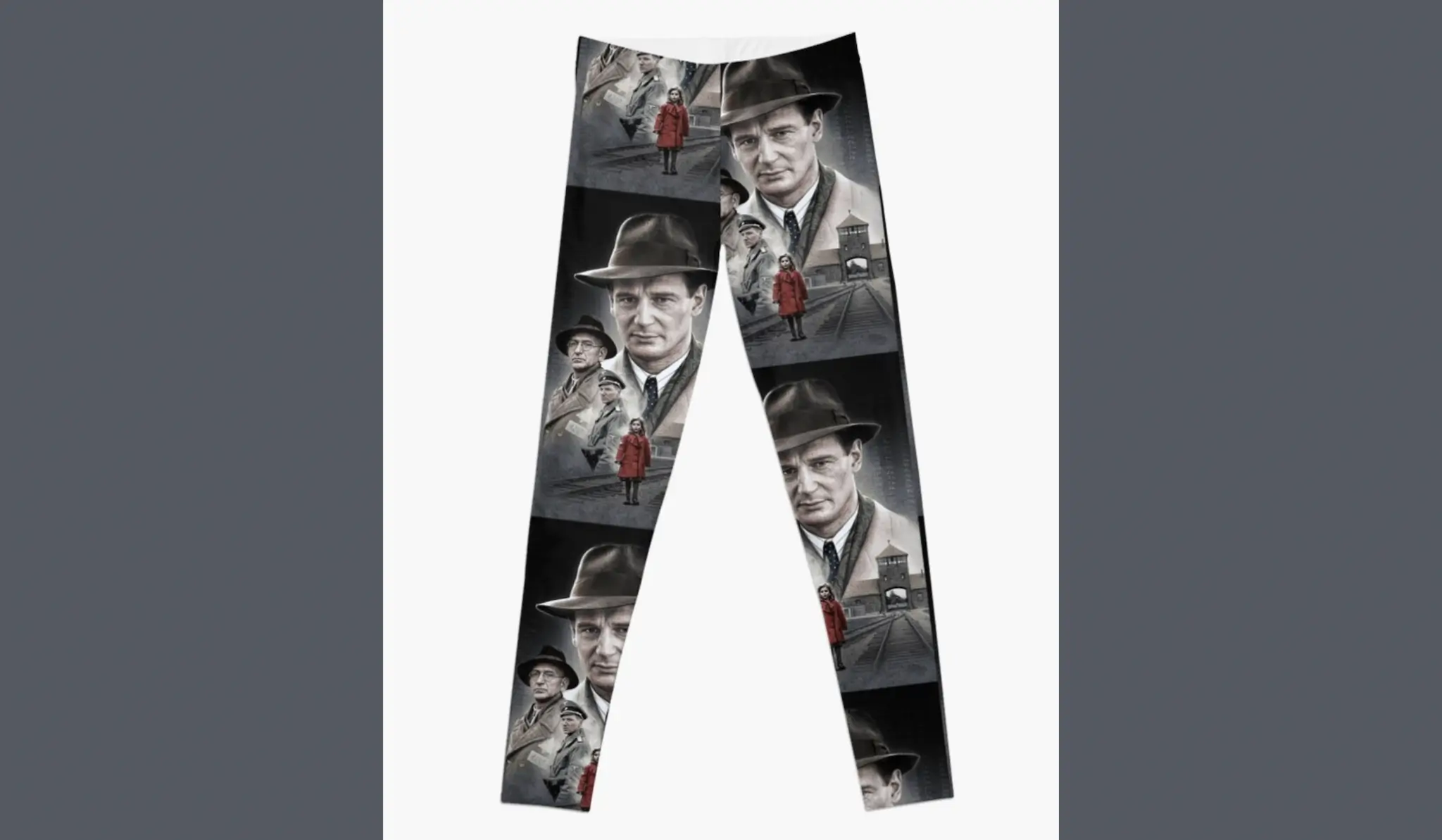E-commerce site Redbubble restricts ‘Schindler’s List’ design after leggings go viral
The design had been for sale on many other products, including skirts, shower curtains and iPhone cases.

“Schindler’s List” leggings for sale on the artisan site Redbubble. Photo by Screenshot
(JTA) – The online design marketplace Redbubble said it had “restricted” sales of a “Schindler’s List”-inspired design on its site after the Jewish Telegraphic Agency reported on a pair of leggings featuring characters from the movie that lit up the Internet this week.
“The artwork referenced in this article has been restricted and we are adding additional monitoring measures as a result,” Redbubble spokesperson Marissa Hermo told JTA in a statement.
The leggings in question, which were first spotted at a Los Angeles thrift store, sported illustrations of characters from Steven Spielberg’s 1993 Holocaust drama, along with an image of a train leading into Auschwitz. They were first posted to a popular Instagram page.
Prior to Redbubble imposing restrictions, the design was for sale on a wide variety of products, including skirts, shower curtains and iPhone cases; the spokesperson said that such items “can be seen as trivializing the subject matter.”
Redbubble allows independent designers to upload and sell their creations on its platform, which can then be printed onto a variety of products.
“With all content uploaded by third party users, occasionally there are content issues that arise that do not comply with our protocols,” Hermo’s statement said. “We proactively monitor the marketplace each day and work to restrict certain designs from specific products when not appropriate.”
How long the “Schindler’s List” products had been available was unclear beyond the fact that it was long enough for a pair of leggings to be purchased, then donated to a thrift store. The items’ original designer did not respond to a JTA request for comment.
Redbubble said it would restrict the design to be available only on “wall art,” and that any other products for sale with the design were the result of “technical issues.” But by the end of the day Thursday, all products with the design had disappeared from its site.
The post E-commerce site Redbubble restricts ‘Schindler’s List’ design after leggings go viral appeared first on Jewish Telegraphic Agency.
The Forward is free to read, but it isn’t free to produce

I hope you appreciated this article. Before you go, I’d like to ask you to please support the Forward.
Now more than ever, American Jews need independent news they can trust, with reporting driven by truth, not ideology. We serve you, not any ideological agenda.
At a time when other newsrooms are closing or cutting back, the Forward has removed its paywall and invested additional resources to report on the ground from Israel and around the U.S. on the impact of the war, rising antisemitism and polarized discourse.
This is a great time to support independent Jewish journalism you rely on. Make a gift today!
— Rachel Fishman Feddersen, Publisher and CEO
Support our mission to tell the Jewish story fully and fairly.
Most Popular
- 1

Culture Cardinals are Catholic, not Jewish — so why do they all wear yarmulkes?
- 2

News School Israel trip turns ‘terrifying’ for LA students attacked by Israeli teens
- 3

Fast Forward Ye debuts ‘Heil Hitler’ music video that includes a sample of a Hitler speech
- 4

Fast Forward Student suspended for ‘F— the Jews’ video defends himself on antisemitic podcast
In Case You Missed It
-

Yiddish קאָנצערט לכּבֿוד דעם ייִדישן שרײַבער און רעדאַקטאָר באָריס סאַנדלערConcert honoring Yiddish writer and editor Boris Sandler
דער בעל־שׂימחה האָט יאָרן לאַנג געדינט ווי דער רעדאַקטאָר פֿונעם ייִדישן פֿאָרווערטס.
-

Fast Forward Trump’s new pick for surgeon general blames the Nazis for pesticides on our food
-

Fast Forward Jewish feud over Trump escalates with open letter in The New York Times
-

Fast Forward First American pope, Leo XIV, studied under a leader in Jewish-Catholic relations
-
Shop the Forward Store
100% of profits support our journalism
Republish This Story
Please read before republishing
We’re happy to make this story available to republish for free, unless it originated with JTA, Haaretz or another publication (as indicated on the article) and as long as you follow our guidelines.
You must comply with the following:
- Credit the Forward
- Retain our pixel
- Preserve our canonical link in Google search
- Add a noindex tag in Google search
See our full guidelines for more information, and this guide for detail about canonical URLs.
To republish, copy the HTML by clicking on the yellow button to the right; it includes our tracking pixel, all paragraph styles and hyperlinks, the author byline and credit to the Forward. It does not include images; to avoid copyright violations, you must add them manually, following our guidelines. Please email us at [email protected], subject line “republish,” with any questions or to let us know what stories you’re picking up.











